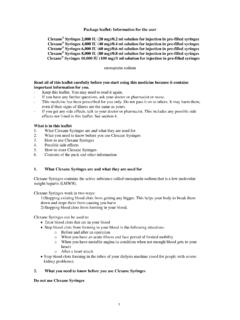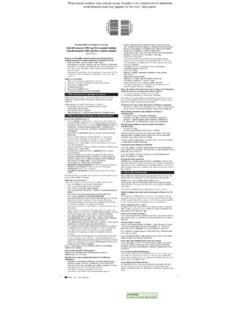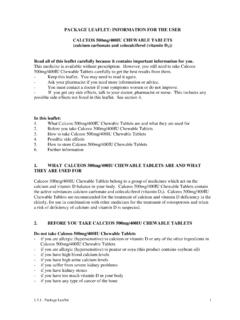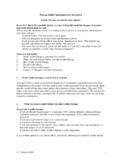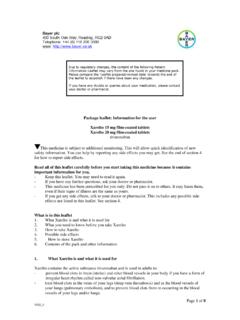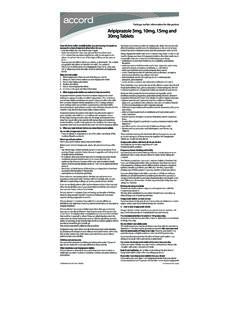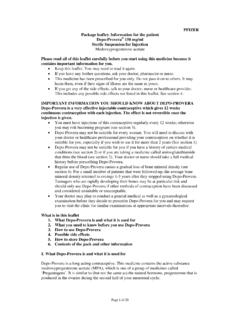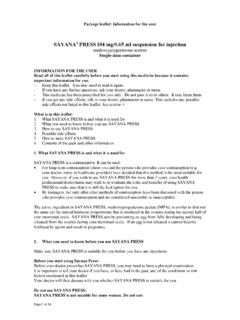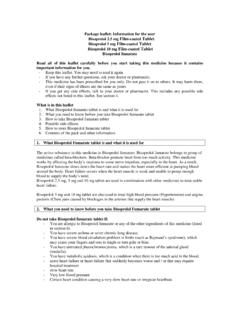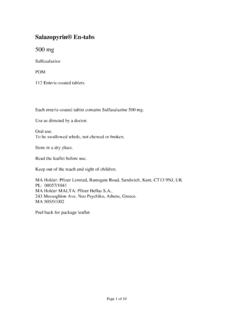Transcription of PATIENT INFORMATION LEAFLET Aspirin 300mg
1 PIL UK 003 PATIENT INFORMATION LEAFLET Aspirin 300mg Gastro-resistant Tablets (acetylsalicylic acid) Read all of this LEAFLET carefully before you start taking this medicine Keep this LEAFLET . You may need to read it again. If you have any further questions, ask your doctor or pharmacist. This medicine has been prescribed for you. Do not pass it on to others. It may harm them, even if their symptoms are the same as yours. If any of the side effects gets serious, or if you notice any side effects not listed in this LEAFLET please tell your doctor or pharmacist.
2 The INFORMATION in this LEAFLET has been divided into the following sections: 1. What Aspirin 300mg is and what it is taken for 2. Check before you take Aspirin 300mg 3. How to take Aspirin 300mg 4. Possible side effects 5. How to store Aspirin 300mg 6. Further INFORMATION 1. What Aspirin 300mg is and what it is taken for Aspirin is used: as an anti-inflammatory analgesic which can relieve pain and swelling to bring down high body temperatures to prevent recurrence of heart attacks or strokes by thinning the blood.
3 If someone who has previously had a heart attack or stroke takes Aspirin 300mg regularly, it reduces the risk of a blood clot occurring in the heart or brain. This can prevent further heart attacks or strokes. If you take Aspirin in high doses or over a long period of time, it can irritate your stomach lining. To prevent stomach irritation, these tablets have a special coating (called enteric) so that the Aspirin is not released until it has passed through the stomach. Aspirin is released slowly from these tablets, so Aspirin 300mg is not suitable for the short-term relief of pain, such as headaches or toothache.
4 2. Check before you take Aspirin 300mg PIL UK 003 Do not take Aspirin 300mg : if you are allergic to Aspirin or if you are allergic to any of the ingredients in Aspirin 300mg (see Section 6 Further INFORMATION ) if you have ever had the problem of your blood not clotting properly if you have ever had an ulcer in your stomach or small intestine. Take special care with Aspirin 300mg Before you take Aspirin 300mg tell your doctor if you: think you may be dehydrated (you may feel thirsty with a dry mouth) have trouble with your kidneys or liver have high blood pressure are asthmatic, Aspirin may induce an asthma attack When given to children Aspirin may cause Reye s syndrome.
5 Reye s syndrome is a very rare disease, which can be fatal. For this reason, Aspirin should not be given to children aged under 16 years, unless on the advice of a doctor. If any of the above applies to you, or if you are not sure, speak to your doctor or pharmacist before you take Aspirin 300mg . Taking other medicines The effect of treatment may be influenced if Aspirin is taken at the same time as some other medicines for: thinning of the blood/prevention of clots ( warfarin) organ rejection after transplantation ( ciclosporin, tacrolimus) high blood pressure ( diuretics and ACE-inhibitors) pain and inflammation ( anti-inflammatory medicines such as ibuprofen, or steroids) gout ( probenecid) cancer or rheumatoid arthritis ( methotrexate)
6 Insulin or any other drug to treat diabetes corticosteroids (used as hormone replacement therapy when the adrenal glands or pituitary gland have been destroyed or removed, or to treat inflammation, including rheumatic diseases and inflammation of the intestines) phenytoin or sodium valproate (used to control epilepsy) sulphonamides (a type of antibiotic) such as sulfamethoxazole medicines such as acetazolamide used to treat glaucoma antacids (indigestion medicine). Do not take antacids just before or after taking Aspirin 300mg as they may cause the Aspirin to be released too soon.
7 Before using Aspirin you should inform a healthcare professional about the medicines you are taking. If you are using Aspirin regularly you should seek advice before taking any other medicine (including other medicines you may have bought). Pregnancy and breast-feeding PIL UK 003 Pregnant women should not take Aspirin during pregnancy unless advised by their doctor. Regular or high dose Aspirin therapy during late pregnancy can cause serious complications in the mother or baby. Do not take Aspirin 300mg if you are breast-feeding because some of the Aspirin may be in your breast milk, and could harm your baby.
8 Ask your doctor or pharmacist for advice before taking any medicine. 3. How to take Aspirin 300mg Always take Aspirin 300mg exactly as your doctor has told you to. You should check with your doctor or pharmacist if you are not sure. The usual dose is different in the following circumstances: Pain and swelling, or fever Take up to three 300 mg tablets three or four times a day. Acute rheumatic disorders (joint and muscle problems) Your doctor will tell you how many tablets to take and how often. You will usually take 4 to 8 grams of Aspirin 300mg a day.
9 Prevention of heart attacks, angina or mini-strokes The usual dose is one or two 75 mg tablets each day. Sometimes, your doctor may tell you to take one 300 mg tablet each day. Swallow the tablets whole with water. Do not cut, crush or chew them as this will damage the special coating. If the coating is damaged the tablets are more likely to irritate your stomach. If you may be taking this medicine for a long time, you should talk to your doctor about it. What to do if you take more Aspirin 300mg than you should If you (or someone else) accidentally take too many tablets, you should tell your doctor at once or contact the nearest casualty department.
10 Show any left over medicines or the empty packet to the doctor. If you forget to take Aspirin 300mg Do not worry. If you miss a dose, wait until it is time for your next dose, then go on as normal. DO NOT take a double dose. If you have any further questions on the use of this product, ask your doctor or pharmacist. 4. Possible Side Effects PIL UK 003 Like all medicines, Aspirin 300mg can cause side effects, although not everyone gets them. The more common side effects of Aspirin include: hypersensitivity (which may mean you have skin rashes or itching, or wheezing or coughing or difficulty breathing) nausea and vomiting ringing in your ears pain or discomfort in your stomach or lower chest after eating.
